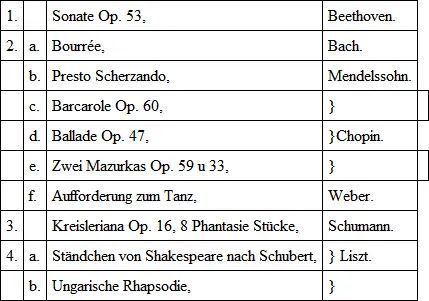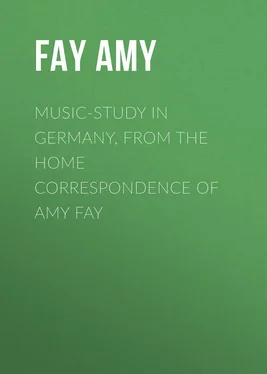Amy Fay - Music-Study in Germany, from the Home Correspondence of Amy Fay
Здесь есть возможность читать онлайн «Amy Fay - Music-Study in Germany, from the Home Correspondence of Amy Fay» — ознакомительный отрывок электронной книги совершенно бесплатно, а после прочтения отрывка купить полную версию. В некоторых случаях можно слушать аудио, скачать через торрент в формате fb2 и присутствует краткое содержание. Жанр: foreign_antique, foreign_prose, на английском языке. Описание произведения, (предисловие) а так же отзывы посетителей доступны на портале библиотеки ЛибКат.
- Название:Music-Study in Germany, from the Home Correspondence of Amy Fay
- Автор:
- Жанр:
- Год:неизвестен
- ISBN:нет данных
- Рейтинг книги:4 / 5. Голосов: 1
-
Избранное:Добавить в избранное
- Отзывы:
-
Ваша оценка:
- 80
- 1
- 2
- 3
- 4
- 5
Music-Study in Germany, from the Home Correspondence of Amy Fay: краткое содержание, описание и аннотация
Предлагаем к чтению аннотацию, описание, краткое содержание или предисловие (зависит от того, что написал сам автор книги «Music-Study in Germany, from the Home Correspondence of Amy Fay»). Если вы не нашли необходимую информацию о книге — напишите в комментариях, мы постараемся отыскать её.
Music-Study in Germany, from the Home Correspondence of Amy Fay — читать онлайн ознакомительный отрывок
Ниже представлен текст книги, разбитый по страницам. Система сохранения места последней прочитанной страницы, позволяет с удобством читать онлайн бесплатно книгу «Music-Study in Germany, from the Home Correspondence of Amy Fay», без необходимости каждый раз заново искать на чём Вы остановились. Поставьте закладку, и сможете в любой момент перейти на страницу, на которой закончили чтение.
Интервал:
Закладка:
The singing is the only thing which could be improved. The Lucca, who is the grand attraction, is a pretty little creature, but I did not find her voice remarkable. The Berlinese worship her, and whenever Lucca sings there is a rush for the tickets. Wachtel and Niemann are the star singers among the men. Niemann I have not heard, but Wachtel we should not rave over in America. I am in doubt whether indeed the Germans know what the best singing is. They have most wonderful choruses, but when it comes to soloists they have none that are really great – like Parepa and Adelaide Phillips; at least, that is my judgment after hearing the best singers in Berlin, though as the voice is not my "instrument," I will not be too confident about it. Everything else is so far beyond what we have at home that perhaps I unconsciously expect the climax of all – the solo singing, to be proportionally finer also.
They have beautiful ballet-dancers here, though. There is one little creature named Fräulein David, who is a wonderful artist. She does such steps that it turns one's head to see her. She is as light as down, and so extremely graceful that when you watch her floating about to the enchanting ballet music, it is too captivating. There were four other dancers nearly as good, who were all dressed exactly alike in white dresses trimmed with pink satin. They would come out first, and dance all together, sometimes separately and sometimes forming a figure in the middle of the stage. Then suddenly little David, who was dressed in white and blue, would bound forward. The others would immediately break up and retire to the side of the stage, and she would execute a wonderful pas seul . Then she would retire, and the others would come forward again, and so it went. It was perfectly beautiful. Finally they all danced together and did everything exactly alike, though little David could always bend lower, and take the "positions" (as we used to say at Dio Lewis's,) better than all the rest.
On Friday I am going to hear Rubinstein play. I suppose he will give a beautiful concert, as he and Bülow, Tausig and Clara Schumann are the grand celebrities now on the piano, Liszt having given up playing in public. After our lesson was over yesterday, Ehlert took his leave, and left us to wait for TAUSIG – my dear! – who was to hear us each play. He came in very late, and just before it was time to give his own lesson. He is precisely like the photograph I sent you, but is very short indeed – too short, in fact, for good looks – but he has a remarkably vivid expression of the eyes. He came in, and, scarcely looking at us, and without taking the trouble to bow even, he turned on me and said, imperiously, " Spielen Sie mir Etwas vor . (Play something for me.)" I got up and played first an Etude , and then he asked for the scales, and after I had played a few he told me I "had talent," and to come to his lessons, and I would learn much. I went accordingly the next afternoon. There were two girls only in the class, but they were both far advanced. I had never heard either of them play before. The second one played a fearfully difficult concerto by Chopin, which I once heard from Mills. It is exquisitely beautiful, and she did it very well. From time to time Tausig would sweep her off the stool, and play himself, and he is indeed a perfect wonder! If, as they say, Liszt's trill is "like the warble of a bird," his is as much so. It is not surprising that he is so celebrated, and I long to hear him in concert, where he will do full justice to his powers. He thrills you to the very marrow of your bones. He is divorced from his wife, and I think it not improbable that she could not live with him, for he looks as haughty and despotic as Lucifer, though he has a very winning way with him when he likes. His playing is spoken of as sans pareil .
I spent a very pleasant Christmas. The family had a pretty little tree, and we all gave each other presents. It was charming to go out in the streets the week before. The Germans make the greatest time over Christmas, and the streets are full of Christmas trees, the shops are crammed with lovely things, and there are little booths erected all along the sidewalks filled with toys. They have special cakes and confections that they prepare only at this season.
CHAPTER III
I have heard both Rubinstein and Tausig in concert since I last wrote. They are both wonderful, but in quite a different way. Rubinstein has the greatest power and abandon in playing that you can imagine, and is extremely exciting. I never saw a man to whom it seemed so easy to play. It is as if he were just sporting with the piano, and could do what he pleased with it. Tausig, on the contrary, is extremely restrained, and has not quite enthusiasm enough, but he is absolutely perfect , and plays with the greatest expression. He is pre-eminent in grace and delicacy of execution, but seems to hold back his power in a concert room, which is very singular, for when he plays to his classes in the conservatory he seems all passion. His conception is so very refined that sometimes it is a little too much so, while Rubinstein is occasionally too precipitate. I have not yet decided which I like best, but in my estimation Clara Schumann as a whole is superior to either, although she has not their unlimited technique.
This was Tausig's programme:

Tausig's octave playing is the most extraordinary I ever heard. The last great effect on his programme was in the Rhapsody by Liszt, in an octave variation. He first played it so pianissimo that you could only just hear it, and then he repeated the variation and gave it tremendously forte . It was colossal! His scales surpass Clara Schumann's, and it seems as if he played with velvet fingers, his touch is so very soft. He played the great C major Sonata by Beethoven – Moscheles' favorite, you know. His conception of it was not brilliant, as I expected it would be, but very calm and dreamy, and the first movement especially he took very piano . He did it most beautifully, but I was not quite satisfied with the last movement, for I expected he would make a grand climax with those passionate trills, and he did not. Chopin he plays divinely, and that little Bourrée of Bach's that I used to play, was magical. He played it like lightning, and made it perfectly bewitching.
Altogether, he is a great man. But Clara Schumann always puts herself en rapport with you immediately. Tausig and Rubinstein do not sway you as she does, and, therefore, I think she is the greater interpreter, although I imagine the Germans would not agree with me. Tausig has such a little hand that I wonder he has been able to acquire his immense virtuosity. He is only thirty years old, and is much younger than Rubinstein or Bülow.
The day after Tausig's concert I went, as usual, to hear him give the lesson to his best class of girls. I got there a little before the hour, and the girls were in the dressing-room waiting for the young men to be through with their lesson. They were talking about the concert. "Was it not beautiful?" said little Timanoff, to me; "I did not sleep the whole night after it!" – a touch of sentiment that quite surprised me in that small personage, and made me feel some compunctions, as I had slept soundly myself. "I have practiced five hours to-day already," she added. Just then the young men came out of the class-room and we passed into it. Tausig was standing by the piano. "Begin!" said he, to Timanoff, more shortly even than usual; "I trust you have brought me a study this time." He always insists upon a study in addition to the piece. Timanoff replied in the affirmative, and proceeded to open Chopin's Etudes . She played the great A minor "Winter Wind" study, and most magnificently, too, starting off with the greatest brilliancy and "go." I was perfectly amazed at such a feat from such a child, and expected that Tausig would exclaim with admiration. Not so that Rhadamanthus. He heard it through without comment or correction, and when Timanoff had finished, simply remarked very composedly, "So! Have you taken the next Etude, also?" as if the great A minor were not enough for one meal! It is eight pages long to begin with, and there is no let-up to the difficulty all the way through. Afterward, however, he told the young men that he "could not have done it better" himself.
Читать дальшеИнтервал:
Закладка:
Похожие книги на «Music-Study in Germany, from the Home Correspondence of Amy Fay»
Представляем Вашему вниманию похожие книги на «Music-Study in Germany, from the Home Correspondence of Amy Fay» списком для выбора. Мы отобрали схожую по названию и смыслу литературу в надежде предоставить читателям больше вариантов отыскать новые, интересные, ещё непрочитанные произведения.
Обсуждение, отзывы о книге «Music-Study in Germany, from the Home Correspondence of Amy Fay» и просто собственные мнения читателей. Оставьте ваши комментарии, напишите, что Вы думаете о произведении, его смысле или главных героях. Укажите что конкретно понравилось, а что нет, и почему Вы так считаете.












